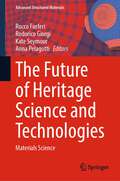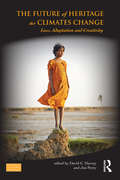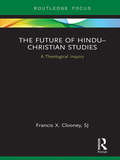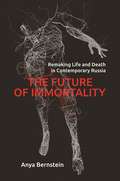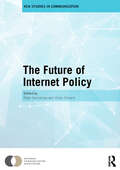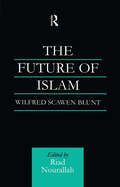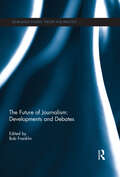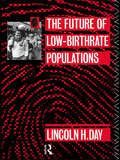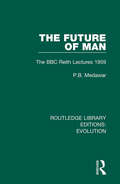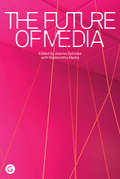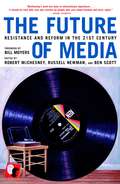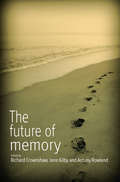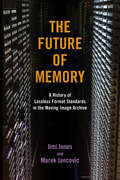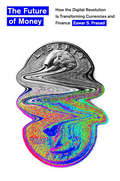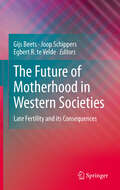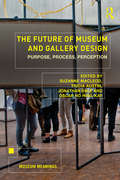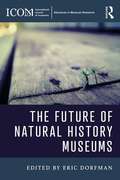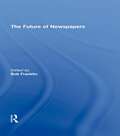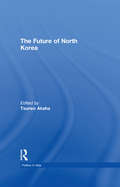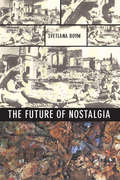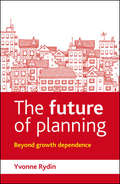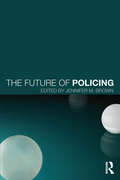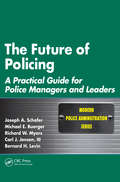- Table View
- List View
The Future of Heritage Science and Technologies: Materials Science (Advanced Structured Materials #179)
by Rodorico Giorgi Rocco Furferi Kate Seymour Anna PelagottiThis book presents selected work from the Florence Heri-Tech, a conference focused on the use of innovative technologies and methods for analyzing, managing, and preserving cultural heritage. This book presents chapters on the chemical and physical advancement in the development of new materials and methods for the conservation and restoration of cultural heritage. It also covers trends in conservation and restoration technology: biotechnology, nanotechnology, tailored materials, and physical technologies. The reader also finds information on methods and instruments for the conservation diagnosis and treatments.
The Future of Heritage as Climates Change: Loss, Adaptation and Creativity (Key Issues in Cultural Heritage)
by David Harvey Jim PerryClimate change is a critical issue for heritage studies. Sites, objects and ways of life all are coming under threat, requiring alternative management, or requiring specific climate change adaptation. Heritage is key to interpreting the societal significance of climate change; notions (and images) of the past are crucial to our understanding of the present, and are used to prompt actions that help society define and achieve a specific and desired future. Relatively little attention has been paid to the critical intersections between heritage and climate change. The Future of Heritage as Climates Change frames the intellectual context within which heritage and climate change can be examined, presenting cases and sub-fields in which the heritage-climate change nexus is being examined and provides synthetic analyses through five overarching themes: The heritage of change among coastal communities: liminality and the politics of engagement Dwelling materials: processes and possibilities; Environmental heritage: meanings of the past – prospects for the future; Blurring the boundaries of nature and culture: the politics of anticipation; Climate change and heritage practice: adaptation and resilience. The Future of Heritage as Climates Change provides scholars, managers, policy makers and students with a much needed examination of heritage and climate change to help make critical decisions in the next several decades.
The Future of Hindu–Christian Studies: A Theological Inquiry
by Francis X. ClooneyThe field of Hindu-Christian studies revives theology as a particularly useful interreligious discipline. Though a sub-division of the broader Hindu-Christian dialogue, it is also a distinct field of study, proper to a smaller group of religious intellectuals. At its best it envisions a two-sided, mutual conversation, grounded in scholars’ knowledge of their own tradition and of the other. Based on the Westcott-Teape Lectures given in India and at the University of Cambridge, this book explores the possibilities and problems attendant upon the field of Hindu-Christian Studies, the reasons for occasional flourishing and decline in such studies, and the fragile conditions under which the field can flourish in the 21st century. The chapters examine key instances of Christian–Hindu learning, highlighting the Jesuit engagement with Hinduism, the modern Hindu reception of Western thought, and certain advances in the study of religion that enhance intellectual cooperation. This book is a significant contribution to a sophisticated understanding of Christianity and Hinduism in relation. It presents a robust defense of comparative theology and of Hindu-Christian Studies as a necessarily theological discipline. It will be of wide interest in the fields of Religious Studies, Theology, Christianity and Hindu Studies.
The Future of Immortality: Remaking Life and Death in Contemporary Russia (Princeton Studies in Culture and Technology #23)
by Anya BernsteinA gripping account of the Russian visionaries who are pursuing human immortalityAs long as we have known death, we have dreamed of life without end. In The Future of Immortality, Anya Bernstein explores the contemporary Russian communities of visionaries and utopians who are pressing at the very limits of the human.The Future of Immortality profiles a diverse cast of characters, from the owners of a small cryonics outfit to scientists inaugurating the field of biogerontology, from grassroots neurotech enthusiasts to believers in the Cosmist ideas of the Russian Orthodox thinker Nikolai Fedorov. Bernstein puts their debates and polemics in the context of a long history of immortalist thought in Russia, with global implications that reach to Silicon Valley and beyond. If aging is a curable disease, do we have a moral obligation to end the suffering it causes? Could immortality be the foundation of a truly liberated utopian society extending beyond the confines of the earth—something that Russians, historically, have pondered more than most? If life without end requires radical genetic modification or separating consciousness from our biological selves, how does that affect what it means to be human?As vividly written as any novel, The Future of Immortality is a fascinating account of techno-scientific and religious futurism—and the ways in which it hopes to transform our very being.
The Future of Internet Policy
by Peter Decherney and Victor PickardAll of the short essays in this volume look past the rhetoric of technological determinism and reliance on the natural logic of the market to consider the power of law and policy to steer new media in one direction or another. Many of the essays look backwards through history or outwards across national borders. They all look forward to how today’s policies will shape the future of the internet and society. A particular focus of interest for some of the contributors is the revelations that followed Edward Snowden’s mass disclosure of classified documents in 2013, which revealed the U.S. National Security Agency’s systematic and longstanding program of monitoring global communications. Some chapters consider different countries’ varying approaches to regulating the proliferation of online communication, while others assess the current state of digital technology. They all call for policy interventions to solve market failures. This book was originally published as a special issue of Critical Studies in Media Communication.
The Future of Islam: A New Edition
by Wilfred Scawen BluntWhen it first appeared in 1882, this book was a pioneering work in every respect. It was the first coherent study of 'modern' Islam, explaining in a simple and functional manner its tenets and roots, the diversity of its cultural and political experience, and its dynamism and potential for good in the modern world. This was at a time when the Muslim world was perceived by most people in the west as inert and spent, caught in an irredeemable malaise of its own making. Blunt's attitude, shaped by several factors and sharpened by personal knowledge of important parts of the Muslim world and close association with many leading reformers in it, was unprecedented and startling at the time. This new edition includes an Introduction and numerous footnotes, updating statistics, explaining the background to historical events and religious and political figures, and filling in gaps.
The Future of Journalism: Developments and Debates (ISSN)
by Bob FranklinThe Future of Journalism: Developments and Debates analyses the radical shifts in journalism which are changing every aspect of the gathering, reporting and reception of news. The drivers of these changes include the rapid innovations in communication technologies, the competitive and fragmenting markets for audiences and advertising revenues, and the collapse of traditional business models for financing media organisations, as well as changing audience requirements for news, the ways in which it is presented and the expansive number of (increasingly mobile) devices on which it is produced and consumed. Each of these trends has significant implications for journalists - for their jobs, workplaces, products and perceptions of their professional roles, ethical judgements and day-to-day practice. They also pose significant challenges for the future funding of a sustainable, critical and high ‘quality’ democratic journalism. The Future of Journalism: Developments and Debates comprises the research-based responses of distinguished academic specialists and professional journalists to the challenging issues involved in assessing the future of journalism. It is essential reading for everyone interested in the changing role of journalism in the economic, democratic and cultural life of communities locally, nationally and globally.This book was originally published as two special issues of Journalism Studies and Journalism Practice.
The Future of Looking Back
by Richard BanksWhat will we leave behind in this new digital age? As digital technology takes an ever-increasing role in our lives, one question is how we'll manage our collections after we're gone. What takes the place of shoeboxes full of pictures and dog-eared record albums? Get an inside look at Microsoft researcher Richard Banks's thinking about how we might manage the digital artifacts and content we're creating now--and how we might pass on or inherit these kinds of items in the future. About the Microsoft Research Series At Microsoft Research, we're driven to imagine and to invent. Our desire is to create technology that helps people realize their full potential, and to advance the state of the art in computer science. The Microsoft Research series shares the insights of Microsoft researchers as they explore the new and the transformative.
The Future of Low Birth-Rate Populations
by Lincoln H. DayFirst Published in 2004. Routledge is an imprint of Taylor & Francis, an informa company.
The Future of Man: The BBC Reith Lectures 1959 (Routledge Library Editions: Evolution #7)
by P.B. MedawarOriginally published in 1960, The Future of Man is a chronicle of Professor Medwar’s Reith lectures of 1959. The book outlines his predictions about the future estate of man, with the ‘process of foretelling, rather than with what is actually foretold’. He asks, can we predict the future size of populations? What is the evidence and theoretical background for the belief that human intelligence is declining? Could human beings become uniformly excellent or is inborn diversity and inequality a necessary part of the texture of human populations? The lectures tried to answer these questions and attempts to end with a definition of the biological standing of man. This book will be of interest to anthropologists, biologists and natural historians.
The Future of Media
by Goldsmiths MediaAn investigation of the future of various media industries and technologies that considers how media shape our future.How do we combat post-truth in the news? Are social media influencers the journalists of today? What is it like to live in a smart city? Does AI really change "everything"? The Future of Media investigates the future of media industries and technologies (journalism, TV, film, photography, radio, publishing, social media), while exploring how media shape our future—on a political, economic, cultural and individual level. Issues of diversity, media reform, labour, activism and art take the discussion into a wider social context. Through this, the book celebrates the importance and vitality of media in the modern world. The Future of Media is also an experiment in collaborative modes of thinking and working. Co-authored by theorists and practitioners from one of the world&’s most established media departments, it offers a radical, creative and critical take on media industries—and on world affairs.
The Future of Media: Resistance and Reform in the 21st Century
by Bill Moyers Robert Mcchesney Russell Newman Ben ScottCo-edited by acclaimed media scholar Robert W. McChesney, the book features chapters by Bill Moyers, FCC Commissioner Michael Copps, Rep. Bernie Sanders, and Newspaper Guild president Linda Foley, among many others. With the American political landscape dominated by the influence of big business, the timing of The Future of Media could hardly be more precipitous. Endlessly pressured by lobbyists payrolled by corporate broadcasters, Congress is poised to reopen the 1996 Telecommunications Act, which will reshape every facet of our media as we know it for decades to come. Winners and losers are about to be decided, while at the same time new technologies are emerging which could truly revolutionize and democratize our media system-and our culture. From cutting edge analysis to blueprints for action, The Future of Media presents a diverse collection of voices from today's growing media reform movement.
The Future of Memory
by Antony Rowland Jane Kilby Richard CrownshawMemory studies has become a rapidly growing area of scholarly as well as public interest. This volume brings together world experts to explore the current critical trends in this new academic field. It embraces work on diverse but interconnected phenomena, such as twenty-first century museums, shocking memorials in present-day Rwanda and the firsthand testimony of the victims of genocidal conflicts. The collection engages with pressing 'real world' issues, such as the furor around the recent 9/11 memorial, and what we really mean when we talk about 'trauma'.
The Future of Memory: A History of Lossless Format Standards in the Moving Image Archive (The History of Media and Communication)
by Marek Jancovic Jimi JonesA new generation of video standards promises lossless storage of digital objects for future generations. Jimi Jones and Marek Jancovic document the development and adoption of JPEG 2000, FFV1, MXF, and Matroska while investigating the social and material aspects of their design and the forces driving their journeys from niche to ubiquity. Drawing on interviews with archivists and developers, Jones and Jancovic reveal the archive as a dynamic space where deeply entrenched social practices produce disagreements but also resourceful collaborations. They contrast the unprecedented rise of archivist-driven standardization and controversies around non-standard technology with the historical dominance of the film and broadcast industries. Throughout, the authors clarify the role of tech companies, software developers, film pirates, hackers, and other players with poorly understood roles in the process. A timely look at the state of audiovisual preservation, The Future of Memory provides a history of recent innovations alongside a snapshot of a field in the midst of profound technological change.
The Future of Money: How the Digital Revolution Is Transforming Currencies and Finance
by Eswar S. PrasadA cutting-edge look at how accelerating financial change, from the end of cash to the rise of cryptocurrencies, will transform economies for better and worse. We think we’ve seen financial innovation. We bank from laptops and buy coffee with the wave of a phone. But these are minor miracles compared with the dizzying experiments now underway around the globe, as businesses and governments alike embrace the possibilities of new financial technologies. As Eswar Prasad explains, the world of finance is at the threshold of major disruption that will affect corporations, bankers, states, and indeed all of us. The transformation of money will fundamentally rewrite how ordinary people live. Above all, Prasad foresees the end of physical cash. The driving force won’t be phones or credit cards but rather central banks, spurred by the emergence of cryptocurrencies to develop their own, more stable digital currencies. Meanwhile, cryptocurrencies themselves will evolve unpredictably as global corporations like Facebook and Amazon join the game. The changes will be accompanied by snowballing innovations that are reshaping finance and have already begun to revolutionize how we invest, trade, insure, and manage risk. Prasad shows how these and other changes will redefine the very concept of money, unbundling its traditional functions as a unit of account, medium of exchange, and store of value. The promise lies in greater efficiency and flexibility, increased sensitivity to the needs of diverse consumers, and improved market access for the unbanked. The risk is instability, lack of accountability, and erosion of privacy. A lucid, visionary work, The Future of Money shows how to maximize the best and guard against the worst of what is to come.
The Future of Motherhood in Western Societies
by Egbert R. te Velde Gijs Beets Joop SchippersMost people value to have children still highly. But what is the optimal moment to have the first? The decision on having children or not and if yes on the timing of the first is one of the most difficult ones to make, also because it more or less coincides with various other heavy decisions on shaping the life course (like on union formation, labour market career, housing accommodation, etc.). People realise that having children will fundamentally change their life and in order to fit this unknown and irreversible adventure perfectly into their life course postponement of the first birth is an easy way out as long as doubts continue and partners try to make up their mind. Modern methods of birth control are of course a very effective help in that period. What is the best moment to have the first child? And to what moment is postponement justified? There are no easy answers to these questions. Best solutions vary per person as they depend on personal circumstances and considerations (the partner may have conflicting ideas; housing accommodation; job; income; free time activities). Existing parental leave and child care arrangements are weighted as well. Unfortunately the biological clock ticks further. And, also unfortunately, assisted reproductive technology (IVF etc.) is unable to guarantee a successful outcome. Several couples end up without children involuntarily and that may lead to sorrow and grief. This interdisciplinary book overviews the process of postponement and its backgrounds in modern Western societies holistically, both at the personal and the societal level. Contributions come from reproductive, evolutionary biological and neurological sciences, as well as from demography, economy, sociology and psychology. It holds not only at women but also at men becoming first time fathers. The discussion boils down to a new policy approach for motherhood and emancipation on how to shape work and family life? It is argued that a public window where one can compose a 'cafeteria'-like set of supportive arrangements according to personal preferences could lead to a break in the rising age at first motherhood.
The Future of Museum and Gallery Design: Purpose, Process, Perception (Museum Meanings)
by Suzanne MacLeod Jonathan Hale Tricia Austin Oscar Ho Hing-KayThe Future of Museum and Gallery Design explores new research and practice in museum design. Placing a specific emphasis on social responsibility, in its broadest sense, the book emphasises the need for a greater understanding of the impact of museum design in the experiences of visitors, in the manifestation of the vision and values of museums and galleries, and in the shaping of civic spaces for culture in our shared social world. The chapters included in the book propose a number of innovative approaches to museum design and museum-design research. Collectively, contributors plead for more open and creative ways of making museums, and ask that museums recognize design as a resource to be harnessed towards a form of museum-making that is culturally located and makes a significant contribution to our personal, social, environmental, and economic sustainability. Such an approach demands new ways of conceptualizing museum and gallery design, new ways of acknowledging the potential of design, and new, experimental, and research-led approaches to the shaping of cultural institutions internationally. The Future of Museum and Gallery Design should be of great interest to academics and postgraduate students in the fields of museum studies, gallery studies, and heritage studies, as well as architecture and design, who are interested in understanding more about design as a resource in museums. It should also be of great interest to museum and design practitioners and museum leaders.
The Future of Natural History Museums (ICOM Advances in Museum Research)
by Eric DorfmanNatural history museums are changing, both because of their own internal development and in response to changes in context. Historically, the aim of collecting from nature was to develop encyclopedic assemblages to satisfy human curiosity and build a basis for taxonomic information. Today, with global biodiversity in rapid decline, there are new reasons to build and maintain collections, while audiences are more diverse, numerous, and technically savvy. Institutions must learn to embrace new technology while retaining the authenticity of their stories and the value placed on their objects. The Future of Natural History Museums begins to develop a cohesive discourse that balances the disparate issues that our institutions will face over the next decades. It disassembles the topic into various key elements and, through commentary and synthesis, explores a cohesive picture of the trajectory of the natural history museum sector. This book contributes to the study of collections, teaching and learning, ethics, and running non-profit businesses and will be of interest to museum and heritage professionals and academics and senior students in Biological Sciences and Museum Studies.
The Future of Newspapers (ISSN)
by Bob FranklinThe future of newspapers is hotly contested. Pessimistic pundits predict their imminent demise while others envisage a new era of participatory journalism online, with yet others advocating increased investment "in quality journalism" rather than free gifts and DVDs, as the necessary cure for the current parlous state of newspapers.Globally, newspapers confront highly variable prospects reflecting their location in different market sectors, countries and journalism cultures. But despite this diversity, they face similar challenges in responding to the increased competition from expansive radio and 24 hour television news channels; the emergence of free "Metro" papers; the delivery of news services on billboards, pod casts and mobile telephony; the development of online editions, as well as the burgeoning of blogs, citizen journalists and User Generated Content. Newspapers’ revenue streams are also under attack as advertising increasingly migrates online.This authoritative collection of research based essays by distinguished scholars and journalists from around the globe, brings together a judicious mix of academic expertise and professional journalistic experience to analyse and report on the future of newspapers.This book was published as special issues of Journalism Practice and Journalism Studies.
The Future of North Korea (Politics in Asia)
by Tsuneo AkahaThis volume explores the possibility of North Korea's'soft-landing' as the most desirable outcome on the Korean Peninsula. The collection of essays by noted students of Asian security examines the perspectives and interests of North and South Korea, the United States, China, Russia and Japan regarding North Korea's future, including the possibility of its neutrality.
The Future of Nostalgia
by Svetlana BoymCombining personal memoir, philosophical essay, and historical analysis, Svetlana Boym explores the spaces of collective nostalgia that connect national biography and personal self-fashioning in the twenty-first century. She guides us through the ruins and construction sites of post-communist cities-St. Petersburg, Moscow, Berlin, and Prague-and the imagined homelands of exiles-Benjamin, Nabokov, Mandelstahm, and Brodsky. From Jurassic Park to the Totalitarian Sculpture Garden, Boym unravels the threads of this global epidemic of longing and its antidotes.
The Future of Planning: Beyond Growth Dependence
by Yvonne RydinFor the past half-century, the planning system has operated on the basis of a growth-dependence paradigm. It has been based on market-led urban development and has sought to provide community benefits from a share of development profits. However, we do not live in a world where growth can be taken for granted and we are more aware than previously of the implications for well-being and sustainability. This timely book provides a fresh analysis of the limitations of the growth-dependence planning paradigm. It considers alternative urban development models, ways of protecting and enhancing existing low value land uses and means of managing community assets within the built environment. In each case it spells out the role that a reformed planning system could play in establishing a new agenda for planning. The book will be of relevance to planning students, planning professionals and planning academics, as well as urban policy specialists more generally.
The Future of Police Reform: The U.S. Justice Department and the Promise of Lawful Policing
by Samuel WalkerThe first thorough study of the Justice Department’s pattern or practice program, examining how it works and how court-imposed consent decrees implement needed reformsAmerican society grapples with an enduring crisis in policing which is inextricably intertwined with the nation’s deeply rooted racial issues. While there have been great strides in policing over the past five decades, the United States continues to wrestle with serious crime and strained relations between law enforcement and African American communities.In this comprehensive analysis, Samuel Walker, a leading figure in the study of criminal justice, focuses on the pivotal federal effort behind police reform—the US Justice Department’s pattern or practice program. Created by Congress in 1994, this program gives the Justice Department the authority to investigate police departments that display patterns of unconstitutional practices, initiate civil suits, and secure court-enforced consent decrees that mandate reform. Walker meticulously examines the reforms dictated by these consent decrees, delves into the challenges of their implementation, and evaluates the progress made by various departments in enhancing police services. Despite various obstacles, the program has proven successful.The Future of Police Reform also considers the broader societal, political, and legal issues that profoundly influence reform efforts, such as an entrenched police subculture hindering change, the formidable power of police unions, and a lack of full support from local political leaders.In conclusion, Walker celebrates reform efforts across the country and foresees a network of local and state centers of activity fostering continued optimism for the future of police reform in the US. A collective effort holds the promise of genuine and lasting change.
The Future of Policing
by Jennifer M. BrownThe police service in England and Wales is facing major challenges in its financing, political oversight and reorganisation of its structures. Current economic conditions have created a wholly new environment whereby cost saving is permitting hitherto unthinkable changes in the style and means of delivery of policing services. In the context of these proposed changes Lord Stevens, formerly Commissioner of the Metropolitan Police Service was asked to chair an Independent Commission looking into the future of policing. The Commission has a wide ranging remit and the papers in this book offer up-to-date analysis of contemporary problems from the novel perspective of developing a reform agenda to assist the Commission.Bringing together contributions from both key academic thinkers and police professionals, this book discusses new policing paradigms, lays out a case for an evidence-based practice approach and draws attention to developing areas such as terrorism, public order and hate crime. Policing is too important to be left to politicians, as the health of a democracy may be judged by the relationship between the police and the public. The aim of this book is to question and present analyses of problems offer new ideas and propose realistically achievable solutions without being so timid as to preserve the status quo. It will be of interest to both academics and students in the fields of criminology and policing studies, as well as professionals in the policing service, NGOs and local authority organisations.
The Future of Policing: A Practical Guide for Police Managers and Leaders (Modern Police Administration)
by Michael E. Buerger Carl J. Jensen III Joseph A. Schafer Richard W. Myers Bernard H. LevinAs communities continue to undergo rapid demographic shifts that modify their composition, culture, and collective values, police departments serving those communities must evolve accordingly in order to remain effective. The Future of Policing: A Practical Guide for Police Managers and Leaders provides concrete instruction to agencies on how to pr
